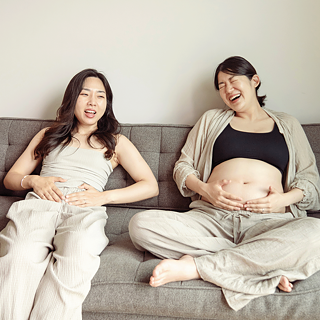KyuJin and Saeyeon Kim:
A family with two mothers
The title of the first lesbian couple in Korea to have a child has earned you both a certain fame. Your story has been reported in many media, but some may not know you yet. Could you tell us again how you met and had your daughter?
We are not the first lesbian couple in Korea to have a child, but we are the first to have our real names and faces featured in the media. This has led many people to think otherwise.
Like many members of sexual minorities, it was challenging for us to naturally meet each other, as not everyone is open about their sexual orientation in daily life. Therefore, we used an online dating platform to connect. We were inspired to pursue marriage and parenthood as a same-sex couple after seeing an American-Korean lesbian couple preparing for their wedding. Although same-sex marriage is not legally recognized in Korea, we were determined to find a way to get married.
As for having children, I initially did not want any, regardless of being in a same-sex relationship, as I had doubts about being a good mother. However, when my employer sent me to France in 2021, I was surprised to learn that same-sex couples with children are not uncommon in France. This realization, along with seeing the happy married life of my partner Saeyeon, who is more optimistic than I am, gradually led me to reconsider. Saeyeon was open to raising a child but not giving birth, so I decided to carry our daughter, and she was supportive of the decision.
So the experiences in France acted as a trigger?
Exactly, that's true. There is a significant difference between witnessing something with your own eyes and not. After the wedding of a lesbian couple was reported in Korea, the number of lesbian couples getting married has increased significantly. I believe that as a result, the number of same-sex couples with children could also increase.
The idea of getting our marriage registered had been on my mind since we got married. Most heterosexual couples around me registered their marriage after the wedding, unless there was a specific reason not to. So, I thought we should do the same.
In 2013, director Kim-Jho Gwangsoo and his husband attempted to register their marriage as a same-sex couple, but were unsuccessful. It was reported that they submitted the registration form by mail, and there was no recorded case of a same-sex couple trying to register a marriage in person at the district office. It is possible that other couples may have tried, but if they were rejected when submitting the form, there would be no record of it.
We found it illogical that we got married but were unable to register our marriage. However, we saw this as an opportunity to bring about change. On our first wedding anniversary, we went to the Jongno-gu district office. Despite my fear of being rejected in person, I believed it was important to set a precedent.
When I went to the counter to submit the documents, they told me, "We cannot accept it." I believe they should have accepted the documents, checked them, and then informed me if it was not possible. I contacted the administration of the Supreme Court in Korea, and after waiting for four hours, I was told that the application must be accepted first. Eventually, we were able to submit our application. Although it was ultimately rejected, this process made it possible for same-sex couples to at least submit a marriage application. We were able to achieve our goal.
The most important thing is that when the application is submitted, it appears in the statistics of marriage applications. As far as I know, about 13 couples have submitted a marriage application after us. That may seem like a small number, but those are 13 couples who overcame all fears and prejudices and tried. In my view, that alone is very significant. In fact, a member of the National Assembly once referred to this statistic, which makes me very proud. I am determined to continue to do such things.
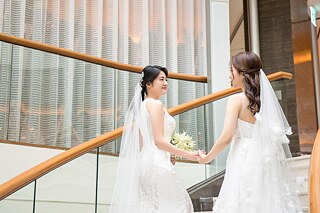
It was also a personal matter. We had already gotten married, so we wanted to register our marriage. It has become something of a fashion among lesbian and gay couples to frame the rejection letter and hang it on the wall. It is proof that you have been rejected, but also that you have shown courage and determination.
Because of the low birth rate in Korea, you get a lot of support from the government even for one child. What kind of government support do you and your wife receive? Tell us more about the birth of your daughter.
Many people believe that we will not receive any state support for the birth of our child. However, since I gave birth to our child, I am registered as a “single parent” and can claim all the available benefits. I have noticed, though, that there is very little support specifically for single parents. Support seems to be available only to single parents with very low income. Those who work are not eligible for support. This experience has made me think more about the experiences of other social minorities, not just those of same-sex couples.
In society, however, the reactions to the birth of our child were more positive than expected. We felt that we had underestimated the people around us. My wife works as a doctor and doctors tend to be quite conservative. But older professors she works with congratulated her. That surprised us a little.
The experiences I've had recently have made me think: “Society is ready for same-sex couples, but it's the state that's lagging behind.” Structurally, there are still many obstacles in our way. For example, our colleagues congratulated us wholeheartedly on the birth of a child to a same-sex couple. However, since my wife is not legally recognized as my spouse, she was unable to take the special leave that spouses are entitled to when a child is born.
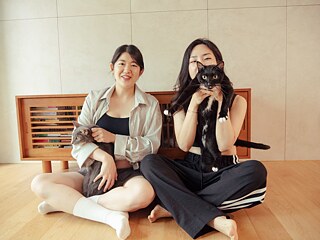
Saeyeon's parents broke off contact when we got married. In my case, my father and mother reacted very differently. Since I came out, my mother has always argued against it in a somewhat lukewarm manner. When I said that we wanted a child, she asked, “Excuse me? Did your father give you permission to do that?" I just thought, "Why do I need my father's permission to do that?" My father, on the other hand, said that as long as I was happy, he was fine with anything. Today, they both think our daughter is cute and love her very much. She looks a lot like her grandmother, my mother, so she couldn't help but take her to her heart. (laughs)
Were there any particularly old people or people you wouldn't have expected to support you when your daughter was born?
As I said, the professors at my wife's work, who are all doctors, really surprised us. Many of our friends' mothers and grandmothers have also been very supportive. If it had been your daughter, they would probably have been pretty upset, but since they were not directly affected, many congratulated us.
Why only the grandmothers? Did none of your friends' grandfathers congratulate you?
Good question. There are hardly any people around us who have a close relationship with their grandfather. This is just a generation from another time...
Your daughter had no choice about whether she wanted to be born into a family with two mothers with the help of a sperm donation. Have you ever thought about the fact that your daughter might later disagree with you two? What kind of family do you want?
We initially faced challenges getting pregnant naturally as they say, leading us to carefully consider and make difficult decisions before eventually achieving pregnancy. As part of the fertility clinic's procedures in Belgium, we underwent two psychological interviews as well. These interviews prepared us for potential questions from society, such as how we would address our child's future inquiry, "Mom, why don't I have a dad?" This was something that I pondered extensively.
My official answer was, 'There are many children in the world who don't have a father, and in Korea, there are 1.5 million single-parent households. There are children from very different families: children who don't have a father or mother, who live with their grandmother, whose parents are divorced, whose parents have disabilities, or whose family has little income. The most important thing is that both of your mothers wanted you because they love each other. And I hope you feel safe at home.'
My wife's response was slightly different: “No child can choose their parents. That's nothing special,” my wife replied.
As I said, ultimately I want a family where our daughter comes home and feels, “Here I am safe, here I am loved.” My wife has also often said that she wants a happy and cheerful family.
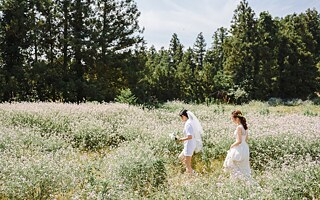
We've thought about this a lot. Our last update was: “One is eomma ('mom' in Korean), one is mommy.” And the one who is mommy speaks only English to the child, so the child is raised bilingually. Funny, right? (laughs) I was just talking about a happy family, and suddenly I'm talking about education... I guess my ideal and reality don't really match up. But I wasn't being entirely serious. Right now, for the sake of simplicity, we say “Saeyeon eomma” and “KyuJin eomma.”
And we are both the woman in the marriage. Many older people think I'm the man, but my wife and I are both wives.
Do you expect same-sex marriage to be legalized in South Korea? And are there any special activities you are developing to achieve this?
I believe that the legalization of same-sex marriage will definitely happen. The number of young people supporting same-sex marriage is already increasing, so I expect it to be legalized one day. I hope it happens sooner rather than later because the longer the legalization process takes, the greater the risk that LGBTQ+ couples will pass away before it happens. There are also many other reasons why I think it would be beneficial if it happened as soon as possible.
That's also why I write texts and am active on social media under my real name and with my face published, even though I'm a regular employee. Because I hope that this might mean we can get married sooner, even if it's just a week.
I read about your book “Eonni, will you marry me? (언니, 나랑 결혼할래요?)” in an article. Before you wrote the book, you must have expected the hate comments, criticism and hostility. What is the real reason that you wrote it anyway?
Even without the book, I get a lot of discrimination, hate and other things for talking about this topic on social media. (laughs)
I work in consumer goods marketing, and I believe it's essential to give tangible form to words and thoughts. I prefer physical products over digital content because there's a significant impact when something is material and can be touched. That's why the medium of a “book,” which you can hold in your hand, still holds a special authority.
The title “Eonni, will you marry me?” catches the eye of people who would otherwise ignore it. That is exactly what I intended. Through the medium of a book, I aimed to raise awareness about the issue and ultimately expedite the legalization of same-sex marriage. Is the book also suitable for children or young people?
Many primary school teachers read the book with their students. That is one of the things that really surprised me. The book cover is very colorful and cheerful and - even if that was not intentional - seems very decent, like a self-help book. The book does not contain anything that could be offensive to children or young people, but is, as young people say today, really "lame". So many primary school students and young people read it, which makes me very happy.
Many people think that children and young people are too young to be concerned with this issue and need to be protected from it. What do you think about this?
Shouldn't children learn about this precisely because they need to be protected? I once saw a politician at a political discussion event who said that the Queer Festival was harmful to young people and should therefore not take place in Seoul Plaza, but somewhere hidden in the city. I remember being very surprised by this because this statement did not take the existence of queer young people into account at all.
Many queer individuals discover their identity during their youth. Since young people are very sensitive and interact a lot with their peers, it is important during this time for them to have someone to talk to about their “otherness”. I realized that I was a lesbian in 8th grade. At that time, I felt like I was floating alone on the wide open sea. This is why I believe that the best way to support young people is to create a safe space where they can openly and honestly discuss their feelings.
I believe that withholding information is never a good idea. It's important for young people, regardless of their sexual orientation, to be aware of the existence of LGBTQ+ individuals. If they grow up with the attitude that heterosexuals are “normal” and sexual minorities are “strange,” they are more likely to become adults who discriminate against or even hate others.
I saw a photo of your marriage proposal, where one of you is on her knees asking for the other's hand in marriage. At first glance, this seems to reflect classic gender roles: the man proposes. Are there moments in your relationship when you unintentionally and unconsciously reproduce classic gender roles?
Think back to when you saw this picture. You probably thought the person kneeling was the man, right? But the person kneeling actually has longer hair, more makeup, and is wearing a skirt. The person standing has short hair and is wearing pants. Confusing, isn't it? (laughs)
Yes, that's exactly what I wanted to convey with the picture. My wife took the picture just for fun, but when I saw it, I thought, “I like it because it's so thought-provoking.” If I had kneeled with my short hair and my wife with her long hair had accepted the proposal, everyone would think, “Ah! The one with short hair is the man.” But with us, one is not the woman and the other the man, we are both women. Either of us could have kneeled without it being unusual. If you want to kneel, you can just kneel. I think this aspect is difficult to understand for people who are used to gender norms or the gender binary.
Ah, another memory comes to mind. In an article about the birth of our daughter, there were many comments under a picture of me heavily pregnant that said, “Oh! In this couple, the man must have had the baby?” I didn't know whether to consider that as gender-sensitive or not! (laughs)
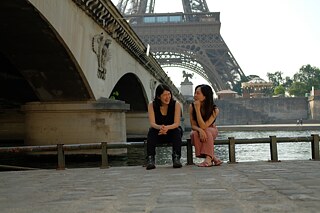
First and foremost, it's important to acknowledge that there is no single correct answer to this issue. The acronym “LGBTIQ,” which encompasses sexual minorities, includes multiple letters because sexual minorities are not a homogeneous group. Even within the “L” category, which stands for “lesbian,” there exists a diverse array of individuals with unique experiences and characteristics.
I believe it is important to simply observe and consider each other, and to approach each person with respect. There is no specific way that sexual minorities should be approached. Ultimately, I hope that everyone will respect each other as individuals and be respected in return.
